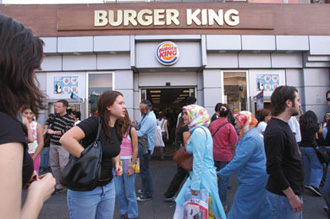 Misunderstanding Islam
Misunderstanding Islam
Q: Question for religious studies professor Vernon Schubel: Disturbing headlines from Iraq to Europe leave many Americans seeing the Muslim world as alien--anti-Western, anti-modern, anti-secular, and violent. Are we heading into a "clash of civilizations"? Has Islam been hijacked by radical fundamentalists who despise Western culture?
A: To my mind, the notion of a "clash of civilizations" is wrong-headed and parochial. The Muslim world has always been intimately connected with cultures of both the "West" and the "East," from Europe and North Africa to Central Asia, China, India, and Indonesia.
There are approximately 1.3 billion Muslims in the world. Yet our media seem to focus only on the very few Muslims whom I would call radical exclusivists, people who define their own particular interpretation of Islam as the only acceptable form of religion and also the only acceptable way to constitute a society.
These exclusivists are in fact relatively marginal. Most Muslims in my experience see their religion in personal and particular ways. They'd like to live in societies where issues of piety are left up to individuals and families. They don't want to force their version of religion down the throats of other people, and they don't want the state to dictate how you have to pray or how your daughter has to dress when she goes out in public.
We have fundamentalist Christians in the United States who are just as exclusionary as the more radical Muslims. The difference is that in our society the exclusivists have a voice through the ballot box, interview programs, letters to the editor. In some of the more authoritarian political environments in the Muslim world, those voices get pushed underground, and in the end the most radical of them resort
to violence.
The exclusivism I'm talking about is not traditionalism; it's nostalgia for a created past, a past that never really existed. Take the idea of "going back" to the time when sharia, Islamic law, was the law of the state. Sharia was never the law of the state. On the contrary, throughout much of history sharia was invoked as a more benign overarching law that could protect you from the capriciousness of a ruler. If the ruler engaged in torture and oppression, there might be some jurist who would say, "That's against sharia, you can't do that to people."
One reason that today's Islamic exclusivists are so virulent is that in many ways the struggle between exclusivism and pluralism has already been decided. Most Muslims want the ability to read whatever they like; many of them want cable television; they want their kids to learn English. They are not always pro-American, but their argument is not primarily with American culture; it's with American foreign policy and American power.
Islam has always been a religion of deep diversity--cultural, linguistic, political, and theological diversity. Islam is dynamic, not static. It's a serious misunderstanding to think that Islam is a timeless, medieval entity clinging to the past and unable to deal with change, or to reduce it to a few visual cues, like minarets, beards, and head scarves.
We have to get past the essentialism that maintains that Muslims and Westerners are fundamentally different kinds of people, that we belong to something called the West, which is normal, and they belong to something "other." We are all part of a shared global human heritage. Plato is part of that heritage. So is Shakespeare. So is the Buddha. So is Muhammad.
Professor of Religious Studies Vernon Schubel teaches a variety of courses about Islam. His research has taken him to Pakistan, Uzbekistan, and Turkey.
Do you have feedback on this page?
